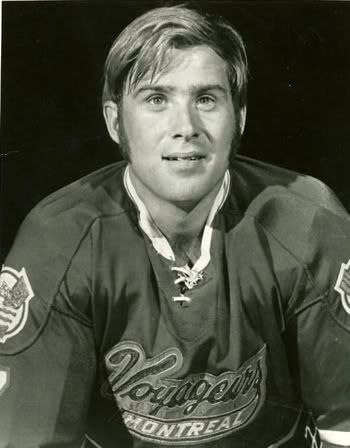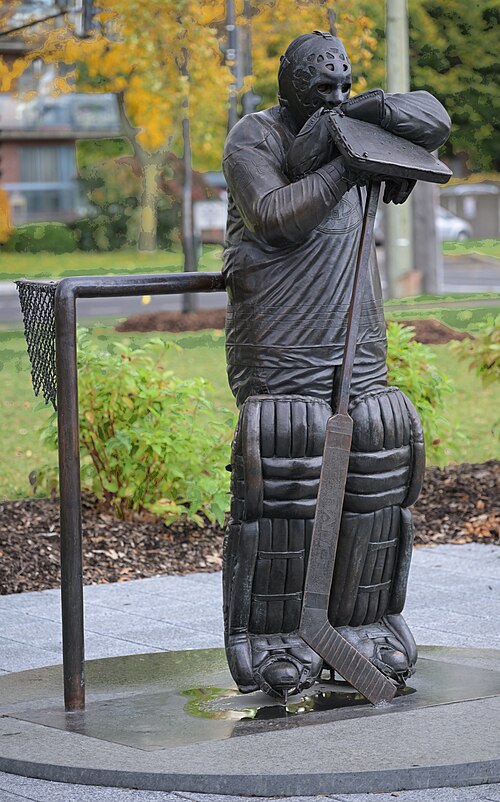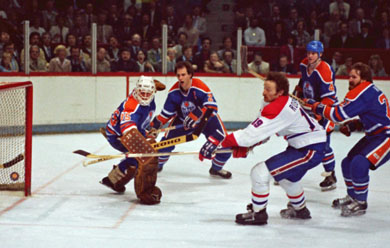Kenneth Wayne Dryden, PC, OC, hockey player, executive, lawyer, politician, author (born 8 August 1947 in Hamilton, ON; died 5 September 2025 in Toronto, ON). One of Canada’s most unique and celebrated athletes, Ken Dryden was a key member of the Montreal Canadiens dynasty of the 1970s. He won the Conn Smythe Trophy while leading the Canadiens to a Stanley Cup victory in 1971. In 1972, he won the Calder Trophy as rookie of the year and backstopped Team Canada to victory in the historic Summit Series. He went on to win five Vezina Trophies as the NHL’s best goalie and a total of six Stanley Cups with Montreal in his eight-year career. Cerebral, analytical and educated as a lawyer, Dryden was Ontario's first Youth Commissioner from 1984 to 1986. He served as a Liberal Member of Parliament (MP) from 2004 to 2011 and as a cabinet minister in the government of Paul Martin. He was also an acclaimed author. An Officer of the Order of Canada, Dryden was inducted into the Ontario Sports Hall of Fame and Canada’s Sports Hall of Fame and received the Order of Hockey in Canada.
Ken Dryden in 1976
Goalie Ken Dryden (No. 29) of the Montreal Canadiens pictured in 1976.
(photo by Bruce Bennett Studios, courtesy Getty Images)
Early Life and Family
Ken Dryden was one of three children born to Murray and Margaret (née Campbell) Dryden. He had a sister, Judy, and a brother, Dave. The family lived in Hamilton before settling in the Islington neighbourhood of Etobicoke, a suburb of Toronto.
Dave was a goaltender with multiple teams in both the National Hockey League (NHL) and the World Hockey Association (WHA). Margaret was a kindergarten teacher, and Murray Dryden was a former brick salesman and an amateur photographer who ran a company that sold plant food. He also started a charity in 1971 that provided beds and bedding materials to thousands of children in underdeveloped countries. He was made a Member of the Order of Canada in 1981 for his philanthropy.
Ken Dryden played hockey with the Humber Valley Packers of the Metro Toronto Hockey League. He attended Etobicoke Collegiate Institute, where he played baseball and basketball. He also played Junior B hockey with the Etobicoke Indians. (See Canadian Junior Hockey.)
Dryden was selected in the third round, 14th overall, in the 1964 NHL Draft by the Boston Bruins. However, after the Bruins learned that Dryden had made the unusual decision to attend university rather than begin his pro hockey career, they traded him to the Montreal Canadiens. (Montreal hockey columnist Red Fisher once wrote, “Dryden was different. This was one goaltender who danced to his own tune.”)

Cornell University
Ken Dryden enrolled at Cornell University and studied history while playing for the Cornell Big Red hockey team. In three seasons with Cornell (1966–69), Dryden was absolutely dominant, posting an overall record of 76–4–1. His goals against average (GAA) over a full season was never higher than 1.81 and his save percentage was never lower than .936. With Dryden in net, Cornell won the NCAA championship in 1967 and three consecutive Eastern College Athletic Conference (ECAC) championships. He was named a first-team All-American three times.
While at Cornell, Dryden was a member of the Sigma Phi Society and vice-president of the Quill and Dagger senior honors society. He graduated with a Bachelor of Arts in 1969. He also played two games for the Canadian team that finished fourth at the 1969 International Ice Hockey World Federation (IIHF) World Championship in Stockholm, Sweden.
NHL Career
Ken Dryden turned professional with the Montreal Voyageurs of the American Hockey League (AHL) in 1970. He posted a goals against average of 2.68 in 33 games with the Voyageurs.
After playing the final six games of the 1970–71 regular season with the Montreal Canadiens — all of which he won, while putting up a 1.65 GAA — Dryden played the entire 1971 playoffs with the Canadiens. They defeated the heavily favoured defending champions, the Boston Bruins, in the first round on the way to winning an unexpected Stanley Cup. Dryden went 12–8 with a 3.01 GAA and a .914 saved percentage and won the Conn Smythe Trophy as playoffs MVP.
At 6-foot-4, Dryden was a new breed of goalie compared to the smaller athletes of the past. (Terry Sawchuk, Tony Esposito and Glenn Hall were considered tall for the position at 5-foot-11. Rogie Vachon, the Canadiens’ No. 1 goalie before being unseated by Dryden, was 5-foot-8.) Dryden was such an imposing and almost impenetrable figure that Phil Esposito once called him a “f—ing giraffe.” Rare among athletes for his cerebral, intellectual side, Dryden was also called “the thinker” due to his thoughtful, trademark pose — standing observantly with his arms folded over the butt of his goalie stick.
Dryden won the Calder Trophy as rookie of the year in 1972 and the Vezina Trophy as the league’s best goaltender in 1973 — all while studying toward a law degree at McGill University. He won the Vezina again in 1976 and shared it with his backup Michel Larocque (as was the rule at the time) in 1977, 1978 and 1979. (See also Vezina Trophy.)
In his seven full NHL seasons, Dryden was first All-Star goalie five times. His record over fewer than eight NHL seasons until his retirement after the 1978–79 season at the age of 31 was the best and most consistent of any modern goalie. He recorded a 2.24 goals-against average, a .922 save percentage and a record of 258–57–74 with 46 shutouts in 397 regular season games. In 112 career playoff games, he went 80–32 with a 2.41 goals-against average, a .915 save percentage and 10 shutouts.
With six Stanley Cups in nine seasons, the Montreal Canadiens teams that Dryden was a part of are considered among the greatest dynasties in NHL history. In particular, the 1976–77 team posted the best regular season record in the modern era (60–8–12). They also went 12–2 in the playoffs, when Dryden became the fifth goalie in NHL history to record four shutouts in a single postseason. In 2014, the Hockey News ranked the 1976–77 Canadiens as the best team in NHL history.
Ken Dryden
Goaltender Ken Dryden (No. 29) of the Montreal Canadiens stands on the ice during a game at the Montreal Forum.
(photo by Bruce Bennett, courtesy Getty Images)
Hiatus
Ken Dryden sat out the 1973–74 NHL season as part of a contract dispute with the Canadiens over his salary, which he felt was too low. In 1973, he graduated from McGill University with a law degree. He then articled with the Toronto law firm Osler, Hoskin and Harcourt. (“Dryden Quits Hockey for Law Clerk Job” read the headline in the New York Times.) He also played hockey as a defenceman in a recreational men’s league in Toronto and worked as a colour commentator for the Toronto Toros of the WHA.
After recording 120 points in the 1972–73 season and winning the Stanley Cup, the Canadiens posted 99 points without Dryden the following season and were eliminated in the first round of the playoffs. They then signed Dryden to a three-year contract worth $200,000 a year, a significant raise from the $80,000 a year he had made previously.
Other Activities
Ken Dryden first became involved in public service in 1971. That summer, he interned for American public safety advocate Ralph Nader’s Public Citizen organization. As part of the so-called “Nader’s raiders,” Dryden and other law students fought against corporate giants and government bureaucrats in various lawsuits aimed at ensuring public safety and environmental standards. Dryden also tried unsuccessfully to organize a similar public interest research group in Ontario.
From 1984 to 1986, Ken Dryden served as Ontario's first Youth Commissioner. In 1986, he issued a report recommending improved job training for youth.
TV Analyst
Following his retirement from hockey, Ken Dryden worked for American TV network ABC as a hockey commentator at the 1980, 1984 and 1988 Olympic Winter Games. Most notably, he provided colour commentary and analysis to Al Michaels during the iconic broadcast of the US men’s “Miracle on Ice” victory at the 1980 Olympic Winter Games in Lake Placid. (Dryden had driven to Ottawa to take his bar exam, which he passed, the day before.)
ABC Sports: 1980 Winter Olympics
Retired NHL goaltender Ken Dryden with ABC Sports commentator Al Michaels at the Sweden vs. USA men's ice hockey game at the 1980 Olympic Winter Games in Lake Placid, New York.
(photo by Steve Fenn, courtesy ABC Photo Archives via Getty Images)
Toronto Maple Leafs President
From 1997 to 2004, Ken Dryden served as president of the Toronto Maple Leafs, his hometown team. He oversaw the move of the team from Maple Leaf Gardens to the Air Canada Centre (now Scotiabank Arena). He also drew praise for his handling of a scandal in which a former Maple Leafs employee was convicted of sexually assaulting numerus boys over many years. (See Maple Leaf Gardens Sex Scandal.)
During Dryden’s tenure, the Maple Leafs went 289–206–61 during the regular season. The team made the playoffs in six of seven seasons and advanced to the Conference Finals twice. However, Dave Feschuk noted in the Toronto Star that “front-office infighting was a central theme, and Dryden was more than once accused of dithering.” Dryden installed himself as general manager at one point and unsuccessfully tried to hire his former teammate Bob Gainey as GM. But instead, before the 2003–04 season, following a change in ownership, Dryden’s position was abolished. He was shifted into the role of vice-chairman of Maple Leaf Sports and Entertainment and given a seat on MLSE's board of directors. The move put him “outside the loop” on hockey decisions.
Ken Dryden
Toronto Maple Leafs general manager Ken Dryden speaks to reporters during a press conference at Maple Leaf Gardens in Toronto, 30 May 1997.
(photo by Harry How, courtesy Allsport via Getty Images)
Career in Politics
In May 2004, Ken Dryden announced that he was resigning from MLSE to run as a Liberal Party candidate in the Toronto riding of York Centre in the federal election on 28 June. He was elected with 54.8 per cent of the vote, more than double that of the second-place finisher, Conservative candidate Michael Mostyn. Dryden was then named minister of Social Development in the Cabinet of Prime Minister Paul Martin. The Liberals were removed from government after losing the 2006 election. But Dryden was re-elected in his riding, once again defeating Mostyn by a wide margin.
When Paul Martin announced his decision to step down as Liberal leader, Dryden emerged as one of eight leadership candidates at the 2006 Liberal leadership convention. However, he was defeated on the second ballot. Liberal leader Stéphane Dion later named Dryden as the chair of the caucus's newly created social justice committee. Dryden ran again in the 2011 election but lost to Conservative candidate Mark Adler by 15 points.
Writing Career
Ken Dryden was also the acclaimed author of 10 books. They include two books on hockey that are unique among sports books for their literate reflectiveness. The Game (1983) is widely regarded as the best hockey book and one of the greatest sports books ever written. In 2024, Sports Illustrated ranked it at No. 9 on its list of the 100 best sports books of all time. The Game gives a detailed and insightfulness account of one week in Dryden’s final season with the Canadiens. A 30th anniversary edition published in 2013 includes a new chapter that recounts Dryden’s day with the Stanley Cup in 1979. Home Game: Hockey and Life in Canada (1989), co-written with Roy MacGregor, explores the cultural significance of hockey in Canada.
Dryden’s first and only novel, The Moved and the Shaken: The Story of One Man’s Life, was published by Penguin Books in 1993. In School: Our Kids, Our Teachers, Our Classrooms (1995), co-written with Roy MacGregor, expands on Dryden’s longstanding interest in Canada’s education system. He attended a Mississauga high school for a year as part of his research. In Becoming Canada: Our Story, Our Politics, Our Future (2010), Dryden searches for what he considers a more accurate national narrative for the country.
In Game Change: The Life and Death of Steve Montador and the Future of Hockey (2017), Dryden examines the life and NHL career of Steve Montador, who was diagnosed with CTE (a brain disease caused by repeated head trauma) after dying suddenly at the age of 35. Scotty: A Hockey Life Like No Other (2019) recounts the life, career and coaching tactics of Dryden’s former coach, the legendary Scotty Bowman. Dryden reflects on the 50th anniversary of the Summit Series in The Series: What I Remember, What It Felt Like, What It Feels Like Now (2022). In The Class: A Memoir of a Time, a Place, and Us (2023), he looks back on the classmates that graduated from Etobicoke Collegiate with him in 1965. All four of these books were national bestsellers.
Legacy
Following Ken Dryden’s death from cancer at the age of 78, Dave Feschuk of the Toronto Star described him as “A deep thinker in an often thoughtless sport.” Feschuk wrote that Dryden “was in many ways the conscience of a mostly shameless sport, a staunch advocate for prioritizing skill over the thuggery that sometimes prevailed in his playing prime, and a vocal critic of the NHL’s denial of the link between brain injuries and CTE. Dryden wasn’t just a legend of the game, he was the consummate student of it, and its need for evolution.” Prime Minister Mark Carney stated, “Few Canadians have given more, or stood taller, for our country.”
Honours
Ken Dryden was inducted into the Hockey Hall of Fame in 1983 and Canada’s Sports Hall of Fame in 1984. In 1985, a bronze statue of Dryden called “The Goalie” was unveiled outside the Raymond Bourque Arena in the Montreal borough of Saint-Laurent. It shows him in his signature pose with his arms folded over the butt of his stick. A similar statue stands inside the Hockey Hall of Fame in Toronto. Dryden was also inducted into Canada’s Sports Hall of Fame a second time in 2005, as part of Team Canada 1972.
Dryden’s No. 29 was retired by the Montreal Canadiens in January 2007. The Cornell Big Red hockey program retired his No. 1 in 2010. (Dryden and Joe Nieuwendyk are the only Cornell hockey players to have their numbers retired.)
In 2013, Dryden was made an Officer of the Order of Canada for his contributions to Canadian life as a hockey player, lawyer and public servant. In 2017, the NHL named Dryden one of the 100 Greatest NHL Players.

Awards
- NCAA All-Tournament First Team (1967)
- All-ECAC First Team (1967, 1968, 1969)
- AHCA East All-American (1967, 1968, 1969)
- ECAC Hockey All-Tournament First Team (1967, 1968, 1969)
- NCAA All-Tournament Second Team (1968, 1969)
- Conn Smythe Trophy (1971)
- Calder Memorial Trophy (1972)
- Vezina Trophy (1973, 1976)
- Vezina Trophy (1977, 1978, 1979, shared with Michel Larocque)
- NHL Second Team All-Star (1972)
- NHL First Team All-Star (1973, 1976, 1977, 1978, 1979)
- Inductee, Hockey Hall of Fame (1983)
- Inductee, Canada’s Sports Hall of Fame (1984)
- Member, Privy Council for Canada (2004)
- Inductee, CoSIDA Academic All-America Hall of Fame (2005)
- Inductee (as part of Team Canada 1972), Canada’s Sports Hall of Fame (2005)
- Inductee, Ontario Sports Hall of Fame (2011)
- Order of Hockey in Canada, Hockey Canada (2020)
Honorary Degrees
- Doctor of Laws, University of British Columbia (1992)
- Doctor of Laws, York University (1996)
- Doctor of Laws, University of Windsor (1997)
- Honorary Doctorate, University of Ottawa (2000)
- Doctor of Laws, McMaster University (2003)
- Doctor of Civil Law, St Mary’s University (2004)
- Doctor of Laws, Ryerson University (now Toronto Metropolitan University) (2013)
- Doctor of Letters, McGill University (2018)
- Doctor of Letters, University of Winnipeg (2018)
Published Works
- Face-off at the Summit (1973), with Mark Mulvoy
- The Game (1983)
- Home Game: Hockey and Life in Canada (1990), with Roy MacGregor
- The Moved and the Shaken: The Story of One Man’s Life (1993)
- In School: Our Kids, Our Teachers, Our Classrooms (1995), with Roy MacGregor
- Becoming Canada (2010)
- Game Change: The Life and Death of Steve Montador and the Future of Hockey (2017)
- Scotty: A Hockey Life Like No Other (2019)
- The Series: What I Remember, What It Felt Like, What It Feels Like Now (2022)
- The Class: A Memoir of a Time, a Place, and Us (2023)

 Share on Facebook
Share on Facebook Share on X
Share on X Share by Email
Share by Email Share on Google Classroom
Share on Google Classroom






.jpg)